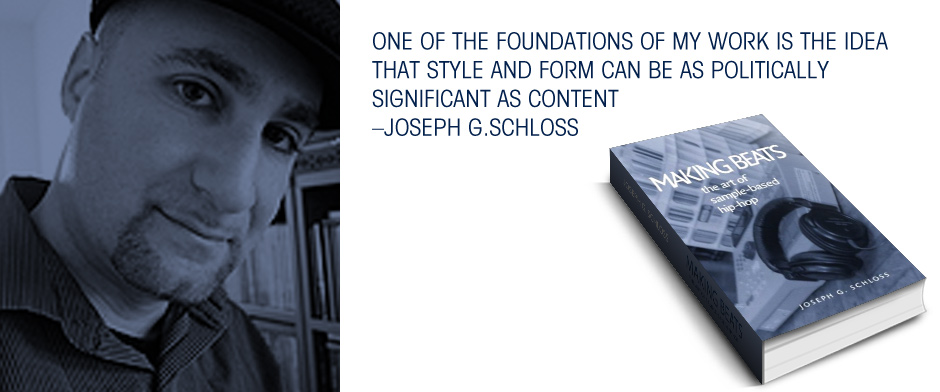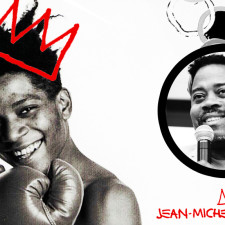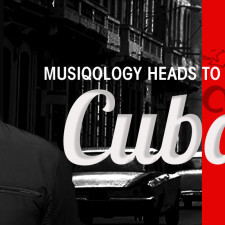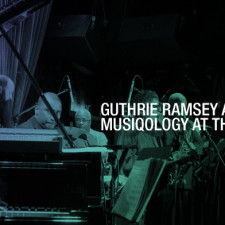For cultural adventurers like us, summer is when routine pressures relax a bit, and we find time to pull it in–catch up with reading, summer concerts, new recordings and with one another. During a recent conversation with Musiqology’s managing editor, Dr. Fredara Hadley (our favorite resident “jooksi”), she suggested that we poke around our favorite music writers and ask them what were some of the most influential writings on their work.
We’re happy to begin our tour with Brooklyn-based ethnomusicologist Joe Schloss. I met Joe back in the day when he was completing his dissertation at the University of Washington. That work would become the important book _Making Beats: The Art of Sample Based Hip Hop_. I’ve always respected his work and teach it often. But my esteem rose exponentially when I witnessed him at a conference in the middle of a makeshift dance floor demonstrating some B-Boy moves to make a specific point to his audience. You know what they say, a show beats a tell any day!
Here’s what Dr. Up Rock believed nourished his writerly, political and theoretical voice.
~Dr. Guy
Joe Schloss (@JoeSchloss): Adjunct Assistant Professor of Black and Latino Studies & Sociology, City University of New York. He studies the deep aesthetic principles of hip-hop as a re-integration of diverse traditions from across the African Diaspora.
So, first, my disclaimer(s): Many of the books that have really influenced my thinking about Black music weren’t about music per se so much as about concepts related to African American culture that could be applied to music or the specific cultural contexts of music that I’m interested in. Also, just in general, I tend to be drawn to academic work that challenges my preconceptions, regardless of whether or not I agree with the actual point the author is making. But based on my understanding of what you’re trying to do in this blog post, I have tried to steer clear of both of these areas, partially because I don’t think that’s what you’re looking for and also because it would probably require too much time to explain what I like about those works. So I just wanted to mention that because it leaves me with what might be seen as the “usual suspects”. Then again, if that is the case, there’s a reason why they have become the usual suspects.
Greg Tate “Flyboy in the Buttermilk”
This was the first book that I can remember that applied a hip-hop intellectual sensibility to musical analysis (including to music that was not hip-hop, which was totally groundbreaking). I also appreciated the way his approach was reflected not only in the content of his writing, but also in its style (but without coming across as precious or mannered). This is a very thin line to walk, and very few writers are able to pull it off successfully (and when they do, they usually come off as Greg Tate imitators). But when it works it really works. This was important to my own development, because one of the foundations of my work is the idea that style and form can be as politically significant as content – sometimes more so – and this book really opened me up to a lot of new ways of addressing that issue.
Olly Wilson “The Heterogeneous Sound Ideal in African American Music”
This article was really groundbreaking for a lot of us, as it posited an abstract aesthetic principle of African American music that was internally consistent, intellectually definable, and not the result of social forces. In other words, it argued for a perspective on African American musical culture that treated it primarily as an aesthetic tradition, as opposed to a strategy for overcoming oppression. Regardless of whether or not you think that idea applies in specific cases, it was really important to have it out there as a point of reference.
Guthrie Ramsey “The Pot Liquor Principle: Developing a Black Music Criticism in American Music Studies”
This article establishes a middle path that views African American music neither as a self-contained aesthetic system free of outside social influences on the one hand, nor as a reactionary product of political forces on the other, but rather as a series of choices made by specific community members in various contexts, for various reasons. The larger historical experiences of people of African descent in the Americas is an important factor in these choices, but far from the only one. More to the point the deployment of a consciousness about the community’s position is itself viewed as one of the historically situated choices being made.
Kyra Gaunt “The Games Black Girls Play”
As an ethnomusicologist, I tend to love analyses that work their way out from the experiences of individuals and small communities to the effect of larger social forces, rather than vice versa, and this is a great example of that kind of work. I also like the way the author includes not only her own position, but also her own intellectual playfulness and social experience as part of the work itself. There is almost a kind of spirituality to her approach, in the sense of having faith in the logic of something larger than yourself (in this case, the community she is studying) that I think is lost in a lot of contemporary scholarship.
Tags: ethnomusicology, greg tate, Guthrie Ramsey, kyra gaunt, musicology, Olly Wilson


 Share On Facebook
Share On Facebook Tweet It
Tweet It





![[VIDEO] Black Music and the Aesthetics of Protest](https://musiqology.com/blog/wp-content/uploads/2015/03/onlynchings1-225x225.jpg)






